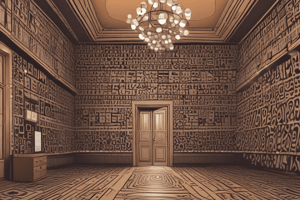Podcast
Questions and Answers
What is the core idea behind Hilbert's Infinite Grand Hotel?
What is the core idea behind Hilbert's Infinite Grand Hotel?
- To show that natural numbers can be represented as decimals
- To prove that there are infinite real numbers in the interval [0, 1]
- To demonstrate the concept of infinity using a hotel analogy
- To find a bijective map between real numbers in the interval [0, 1] and natural numbers (correct)
What is the purpose of labeling real numbers in the interval [0, 1] as 1, 2, 3, ..., N?
What is the purpose of labeling real numbers in the interval [0, 1] as 1, 2, 3, ..., N?
- To show that there are infinite real numbers in the interval [0, 1]
- To prove that every real number can be represented as a decimal
- To demonstrate the concept of infinity using a counting process
- To find a bijective map between real numbers in the interval [0, 1] and natural numbers (correct)
What is the decimal representation of the number √(1/2)?
What is the decimal representation of the number √(1/2)?
- 0.5
- 0.707106... (correct)
- 0.25
- 0.333333...
What is the significance of the list on the left, which matches real numbers in the interval [0, 1] with natural numbers?
What is the significance of the list on the left, which matches real numbers in the interval [0, 1] with natural numbers?
What is the logic behind defining the number 0.b1 b2 b3 ...?
What is the logic behind defining the number 0.b1 b2 b3 ...?
What is the purpose of the diagonal argument in Hilbert's Infinite Grand Hotel?
What is the purpose of the diagonal argument in Hilbert's Infinite Grand Hotel?
What is the implication of the number 0.b1 b2 b3 ... not being in the list?
What is the implication of the number 0.b1 b2 b3 ... not being in the list?
What is the main idea behind the construction of the number 0.b1 b2 b3 ...?
What is the main idea behind the construction of the number 0.b1 b2 b3 ...?
What is the significance of the assumption that all decimal representations are in the list?
What is the significance of the assumption that all decimal representations are in the list?
What is the conclusion that can be drawn from Hilbert's Infinite Grand Hotel?
What is the conclusion that can be drawn from Hilbert's Infinite Grand Hotel?
Flashcards are hidden until you start studying
Study Notes
Concepts of Infinity
- Some infinities are larger than others, a concept introduced by Georg Cantor.
- Hilbert's Infinite Grand Hotel serves as an illustration of paradoxical scenarios that arise from actual infinity.
Hilbert's Hotel
- Imaginary hotel with infinitely many rooms, meant to explore the consequences of infinite sets.
- Introduced by David Hilbert in a 1924 lecture, though initially thought to be folklore.
- Used to discuss concepts in cosmology, philosophy, and theology since the 1970s.
Set Theory
- Sets can be named using capital letters and described with elements or set notation.
- Examples of sets:
- A = {a, b, c} (first three letters).
- B = {Saturday, Sunday} (weekend days).
- C = {1, 2, ... , 10} (integers from 1 to 10).
Functions
- Functions are rules linking inputs from one set to outputs in another, with each input assigned exactly one output.
- A function can be one-to-one (1-1) or onto (covers entire range).
- Types of matches:
- One-to-one match: each element in A maps to a unique element in B.
- Onto match: every element in B is covered by mappings from A.
Counting and Set Sizes
- Georg Cantor defined set size through bijective functions, allowing calculation of elements in a set.
- A set is finite if it can be perfectly matched with a subset of natural numbers.
- Size of a finite set A can be denoted as |A| = n.
Countable Sets
- The set of positive odd numbers and the set of all integers are both countable.
- Example bijections:
- Set of odd numbers: f(n) = 2n - 1.
- Set of all integers Z: f(n) defined based on even or odd n.
Rational Numbers
- The set of positive rational numbers is also countable, represented through various ratio forms.
- Rational numbers are expressed as fractions a/b, with a and b as integers and no common divisor other than 1.
Uncountable Sets
- Question raised regarding the countability of real numbers in the interval [0, 1].
- If a bijective map between real numbers in [0, 1] and natural numbers existed, it would imply listing all decimal representations.
Constructing a New Number
- From any presumed complete list of numbers in the interval [0, 1], a new number can be defined based on altering decimal digits.
- The new number, generated by modifying the digits of listed decimals, illustrates a contradiction, affirming that real numbers are uncountable.
Studying That Suits You
Use AI to generate personalized quizzes and flashcards to suit your learning preferences.



